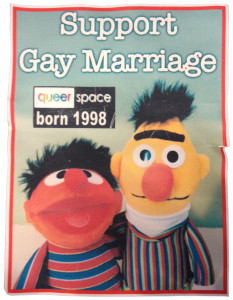 LONDON — The U.K. Supreme Court has agreed to hear the appeal of a Christian family that was ordered to pay damages to a homosexual rights activist for declining to write the words “support gay marriage” on a cake.
LONDON — The U.K. Supreme Court has agreed to hear the appeal of a Christian family that was ordered to pay damages to a homosexual rights activist for declining to write the words “support gay marriage” on a cake.
“The fact that the Supreme Court is willing to hear arguments is very encouraging and reflects the importance of the issues and the high-profile nature of the case,” Ashers Baking Company Manager Daniel McArthur said in a statement following word of the development.
As previously reported, in May 2014, the company—named after Genesis 49:20—was approached by a same-sex “marriage” supporter to bake a cake that was to feature the phrase, as well as the logo for the homosexual advocacy group QueerSpace. According to the Belfast Telegraph, the cake was for an event in observance of the International Day Against Homophobia and Transphobia.
McArthur’s mother, Karen, initially accepted the order as she didn’t want the man to feel embarrassed. But as the matter was discussed with other family members, it was agreed upon that they could not go through with putting the message on the cake in good conscience before God.
McArthur told reporters that the company contacted the customer and offered a refund, explaining that same-sex “marriage” is against their Christian beliefs.
However, the customer, Gareth Lee, soon reported Ashers Baking Company to the Equality Commission of Northern Ireland, which in turn sent a warning to to McArthur, stating that he and his bakery had discriminated against Lee.
In November 2015, the Commission ordered the bakery to pay compensation or face legal action. As the McArthur’s refused, the case moved forward in court. Judge Isobel Brownlie then ruled against the McArthurs, declaring them “guilty of unlawful discrimination on the grounds of sexual orientation,” and ordered the bakers to damages equating to nearly $800 U.S. dollars.
“This is direct discrimination for which there can be no justification,” Brownlie said. “The defendants are not a religious organization. They are conducting a business for profit and, notwithstanding their genuine religious beliefs, there are no exceptions available under the 2006 regulations which apply to this case.”
Asher’s Bakery has stated that it is willing to serve homosexuals in general—one would not know about another’s sexual behavior unless they had requested a cake for such reasons—but should not be forced to decorate cakes with messages that urge others to “support gay marriage” in violation of God’s law.
“This has never been about the customer. It has been about a message promoting a cause that contradicts the Bible,” McArthur said.
The McArthur’s therefore appealed the ruling last June, and the case went back to court. In October, the Belfast Court of Appeals concluded that although it is true that the McArthurs did not know Lee’s identity, the bakery still “discriminated against the respondent directly on the grounds of sexual orientation contrary to the Equality Act Regulations 2006″ for not printing the requested message.
The family consequently appealed to the U.K. Supreme Court.
“This is a very important development. The Supreme Court does not consider every case which is brought to its attention and our legal team has already started to prepare for the crucial hearings which lie ahead,” Simon Calvert of the Christian Institute noted.
“We understand the Supreme Court will hear initial arguments from which they will then determine if they are to grant a full appeal hearing. If the judges agree to the appeal it will take place immediately during the two days set aside for the case to be discussed,” he explained.
As previously reported, in April 2015, an appeals court in Kentucky overturned a guilty verdict against Christian screenprinter Hands on Originals, stating that the business had a right to decline to print wording on t-shirts for a “gay pride” event.
The court noted that from 2010-2012 Hands on Originals declined 13 orders from various groups because of the message that was to be printed.
“Those print orders that were refused by HOO included shirts promoting a strip club, pens promoting a sexually explicit video and shirts containing a violence-related message,” it explained. “There is further evidence in the Commission record that it is standard practice within the promotional printing industry to decline to print materials containing messages that the owners do not want to support.”
Become a Christian News Network Supporter...


